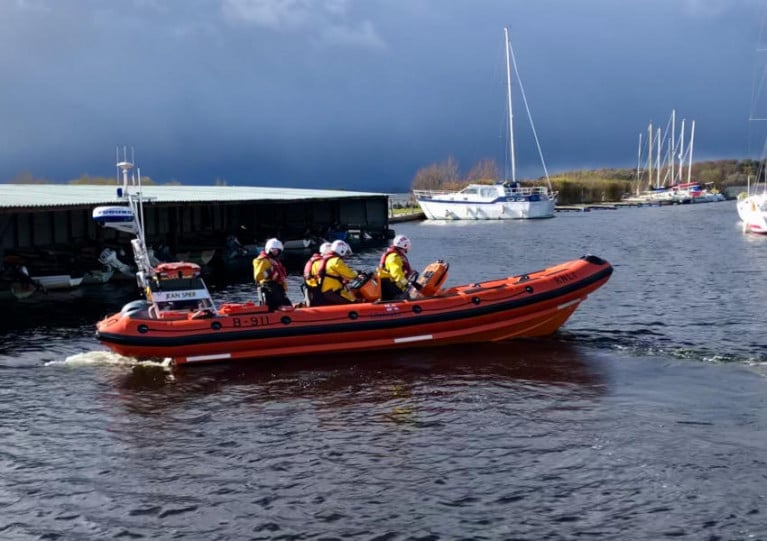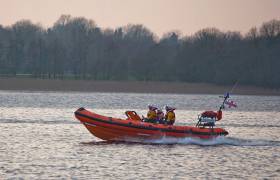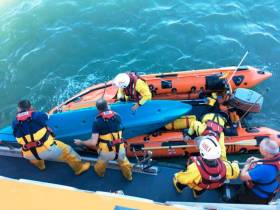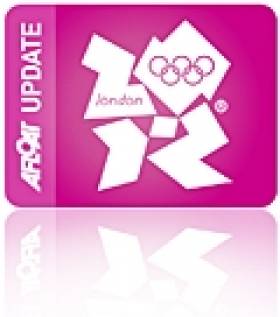Displaying items by tag: BBC TV
The volunteer lifeboat crew from Larne RNLI in Northern Ireland will feature in the new series of popular TV show Saving Lives at Sea on BBC Two at 8pm next Thursday 12 October.
Featuring footage captured on helmet and boat cameras, viewers watch dramatic rescues through the eyes of RNLI lifesavers while meeting the people behind the pagers and those rescued by the charity’s lifesavers.
The popular 10-part documentary is now in its eighth series and includes the lifesaving work of RNLI volunteer lifeboat crews and lifeguards from around Ireland and the UK.
It’s also available to watch on the BBC iPlayer for viewers in the UK following broadcast.
Including interviews with lifeboat crews and lifeguards, the series will also hear from those rescued and their families who, thanks to RNLI lifesavers, are here to tell the tale.
This forthcoming episode, on Thursday 12 October, includes Larne RNLI’s rescue of a capsized kayaker alongside rescue stories from their colleagues at other stations and beaches around the coast.
Larne RNLI helm Barry Kirkpatrick, who was on the call-out and will feature in the upcoming episode, said: “Our lifesaving work would not be possible without donations from the public and we are delighted to be able to share a frontline view of the rescues they support with their kind generosity.
“This is the first time Larne RNLI features on the Saving Lives at Sea series and this rescue is a good example of where our volunteers’ training, skills and experience all come to the fore in helping bring a casualty to safety. It also highlights the great teamwork not just among our own volunteers but with our colleagues from the various emergency services.
“The call for help in this rescue comes late at night following reports of a person capsized from their kayak. After a search, we locate the casualty floating on his back in the middle of the bay, who is estimated to be in the water for up to one hour and very cold.
“We bring him onboard the lifeboat and make our way back to the beach as quickly as possible while beginning first aid to try and warm him up but we are concerned about signs of hypothermia. Once on shore, we are assisted by our colleagues in the coastguard and the Northern Ireland Ambulance Service.
“In this rescue, the casualty's wife does the right thing by calling 999 and asking for the Coastguard when she realises her husband is in difficulty in the water. The kayaker also does the right thing by floating on his back with his arms stretched out. He is floating to live.”
If you get inspired to volunteer with the RNLI by the series, there are a variety of roles from lifeboat crew, to fundraiser, lifeguard to shop volunteer. Fund out more at rnli.org/volunteer
Tuesday 13 October at 8pm is the date and time for your TV diary to see the volunteer crew of Lough Derg RNLI feature in the current series of Saving Lives at Sea on BBC Two.
Viewers will see Lough Derg’s lifeboat crew rescue a man who fell overboard in rough weather and an eerie night time launch in fog, alongside rescue stories from their colleagues at other stations and beaches around our coasts.
Saving Lives at Sea features real-life rescue footage captured on helmet cameras gives a frontline view of how the RNLI’s lifesavers risk their own lives as they go to the aid of those in danger at sea.
That’s accompanied by emotive interviews from the volunteer lifeboat crews and lifeguards from around Ireland and the UK, alongside the people they rescue and their families.
Lough Derg’s upcoming profile follows on from Lough Ree lifesavers’ appearance in last year’s series of the hit TV documentary, as previously reported on Afloat.ie.
And in next week's episode, the volunteer crew of Skerries RNLI will feature with their rescue of a teenage paddle boarder who was blown out to sea.
“It’s great that we can showcase the lifesaving work of RNLI volunteers in a TV programme like this,” said Lough Derg helm Eleanor Hooker.
“In recent months, the pandemic has presented RNLI volunteers with additional challenges, but we’ve continued to maintain a 24/7 search and rescue service.
“This year, due to Covid, fundraising events have been cancelled and we’ve seen a drop in our charitable income. Without the generous support and donations from the public, we wouldn’t be able to save lives at sea.
“It’s great that with the Saving Lives at Sea programme our supporters can see what we do out on a shout, and from the comfort of their own home. We need their support more than ever during these challenging times.”
Saving Lives at Sea is broadcast Tuesdays at 8pm on BBC Two, NI, and viewers in the UK can also watch the series on demand following broadcast on the BBC iPlayer.
Lough Ree Lifeboat Volunteers Feature In Latest Series Of BBC’s ‘Saving Lives At Sea’
Lough Ree RNLI’s lifeboat volunteers will be showcased on the small screen in an upcoming episode of BBC TV series Saving Lives at Sea.
Tune in to BBC Two on Tuesday 15 October at 8pm to see the Lough Ree crew on two callouts, firstly when they launch to the aid of two fishermen whose boat is swamped during a fishing competition.
Next they’re tasked come to the aid of an elderly man taken ill on the island of Inch Bofin — alongside rescue stories from their colleagues at other stations and beaches around Ireland and Britain’s coasts and inland waters.
Lough Ree’s appearance follows last year’s profile of Courtown’s lifesavers, as previously reported on Afloat.ie.
Lough Ree RNLI helm Tom Bradbury says: “It’s great to see the work we do on TV like this.
“We’re always grateful for the support we get from the public as we rely on donations to do what we do, so it great that all our supporters now get to see, from the comfort and safety of their own front rooms, exactly how they help us save lives.”
Filming for the fourth series of Saving Lives at Sea took place over the past year, with lifeboat crews and lifeguards carrying special cameras and welcoming film-makers into their day-to-day life.
Rescues from the RNLI’s archives are also revisited, and viewers can get a glimpse into the everyday lives of the thousands of men and women who give up their time to save lives.
Viewers in the UK can also watch the series on demand following broadcast on the BBC iPlayer.
#RNLI - Courtown’s RNLI lifeboat volunteers feature in the new series of Saving Lives at Sea on BBC Two this week.
Now on its third year, Saving Lives at Sea puts the spotlight on the RNLI’s army of unpaid volunteers around the UK and Ireland who out their lives on the line to save others.
Using footage shot on the crews’ own cameras, the maritime TV series takes viewers into the heart of the action, capturing the unpredictable work of the RNLI in unique detail.
The 10-part third season begins tonight (Tuesday 21 August) at 8pm, following the crew of Salcombe lifeboat station in Devon on two vital callouts — to a fisherman pulled to the bottom of the sea in his own fishing gear, and a devastating fire on a boat 15 miles out in the English Channel.
Over 200 miles away in the waters off Anglesey, meanwhile, the crew of Moelfre station uncover a story of survival and heroism as they go to the rescue of a father and his 13-year-old son missing at sea.
Courtown RNLI in Co Wexford will be a part of episode two this Thursday evening (23 August) at 8pm on BBC Two, as they face one of their most challenging missions — keeping a teenage girl with suspected spinal injuries immobile and afloat until she can be airlifted for treatment.
BBC To Air Skandia Sail for Gold Regatta
The BBC is set to broadcast two documentaries on Olympic Classes sailing, produced by Sunset+Vine|APP in association with BBC Sport. Part 1 of “Olympic Sailing” will air this Saturday, 21 August , at 1300 on BBC 1. It tells the story of Britain’s medal winners at the Skandia Sail for Gold Regatta where nearly 1000 sailors from 57 nations competed at the Weymouth and Portland National Sailing Academy, the venue for the sailing competition for the London 2012 Games.
The documentary will follow the highs and lows of this international competition that includes Britain’sBeijing gold medalliists Ben Ainslie, Iain Percy and Sarah Ayton plus a host of medallists from the 2008 Games, as they compete on home waters exactly two years ahead of the London 2012 sailing competition.
BBC cameras were invited behind the scenes into the Skandia Team GBR camp for an exclusive tour of the new team accommodation just metres away from the Olympic venue where Shirley Robertson – herself a double Olympic gold medallist - discovers the systems the British team have put in place in order to have the best chance of winning medals. She meets Skandia Team GBR’s newest support crew member, falconer Brian Williams, who with his birds of prey at six o’clock in the morning take on the dawn chorus of local seagulls in a bid to provide the sailors with their last hours of valuable sleep.
The documentary catches up with medal-winning husband and wife team Nick Dempsey and Sarah Ayton, and joins Ainslie, Percy and his crew Andrew ‘Bart’ Simpson for an insight into what makes this renowned team tick. Shirley also meets the young British team sailors struggling to get into the elite squad and earn themselves a place in the main squad where no stone is left unturned in the quest for medals.
The Skandia Sail for Gold regatta was the largest ISAF Sailing World Cup event in 2010, and provided an insight for many 2012 teams into the future Olympic venue.
On Sunday 5 September at 1400 on BBC 2, “OLYMPIC SAILING” (Part 2) will come from Hayling Island on the final day of the Laser World Championships where Beijing gold medallist Paul Goodison is out to defend his title. The programme will also include features on the man to break Ben Ainslie’s six-year winning record in the Olympic Finn class, 23 year-old British sailor Giles Scott, and on perhaps the happiest medal winner of all at the last Games – Britain’s Britain's Bryony Shaw who windsurfed to bronze in China.
BROADCAST TIMES:
“OLYMPIC SAILING” (Part 1) Saturday 21 August 1300 – 1350, BBC1
“OLYMPIC SAILING” (Part 2) Sunday 5 September – 1400, BBC2
BOTH PROGRAMMES CAN BE WATCHED ON BBC iPLAYER after transmission dates

































































